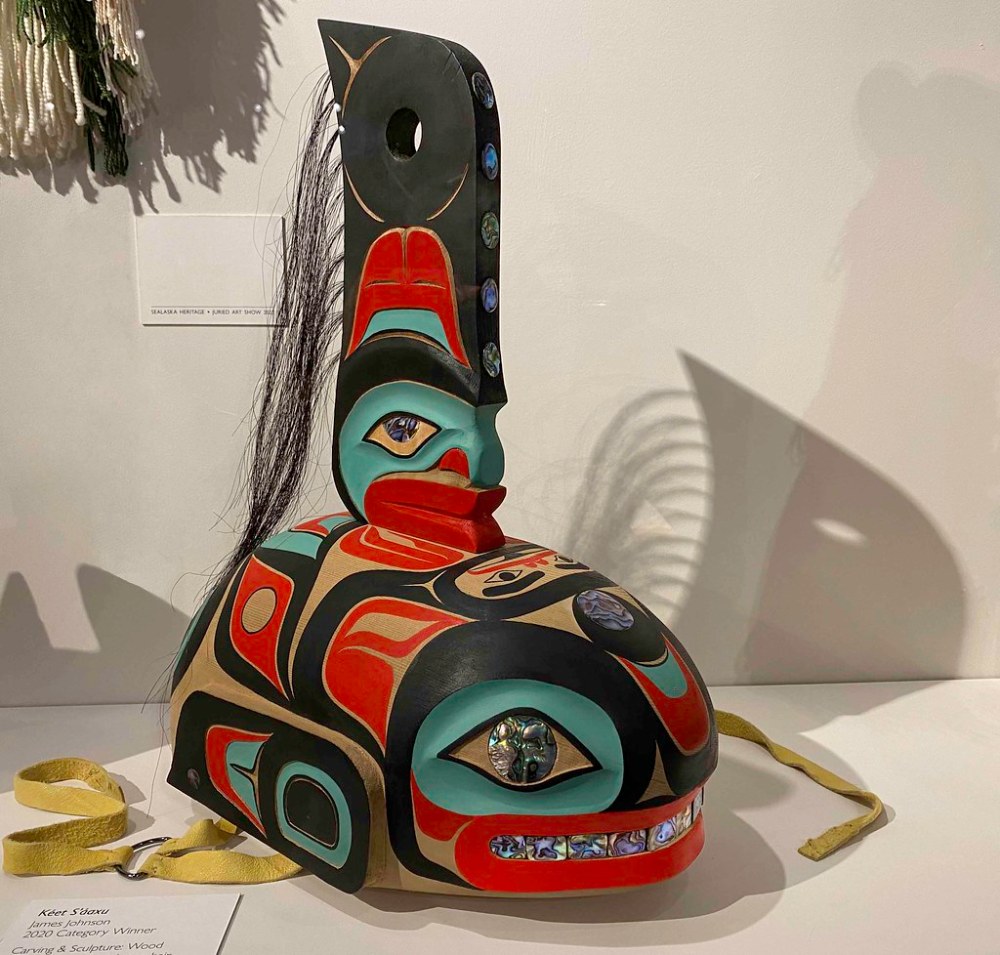Get to Know Tlingit Culture While Visiting Juneau

Juneau is the traditional homeland of the Tlingit people who have lived in the area for more than 10,000 years. Residing here where the land meets the sea, they have a unique relationship with the ocean having relied on it for much of their food. Traveling in outrigger canoes carved out of cedar trunks and stretching up to 60 feet long, they fished for herring, halibut, and cod. Invented in Juneau, the canoes, at their most basic form are vessels with two poles tied to the seat and a net tied in between. While simple, their invention helped kickstart serious naval seafaring efforts in the region, reducing the chances of capsizing while providing extra space for trade goods and fish in the netting.
The craftsmanship of the outrigger canoes developed into very high quality vessels over time and by 350 AD, they were used by various Tlingit tribes, transforming the Pacific Northwest. Adopted into the list of items traded, given away, or destroyed at ritual feasts that we know today as the potlach, they helped make these events become even more desirable to attend.

The Tlingit People Today
There are still around 17,000 Tlingit living in Alaska today, including many right in the Alaskan capital where the Central Council of the Tlingit and Haida Indian Tribes of Alaska (CCTHITA) is located, representing them worldwide. They continue their rich traditions, including fishing in the Gastineau channel. But they also participate in modern commerce and culture, allowing their experience and knowledge to shape the future the present and future. Their culture is based on reciprocity and balance, while respect remains a key quality.
There is special significance on kinship and family in the Tlingit culture, with generosity as important as prosperity. They abide by the matrilineal kinship system, with descent passing through the mother’s line and each group displaying its heraldic crest on everything from jewelry to canoes and totem poles.

A Unique and Extraordinary Relationship with the Sea
The lives of the Tlingit people revolve around the harvest from the sea right outside their door, with the waters of Juneau and Southeast Alaska providing one of the world’s richest maritime environments. Partners with nature, they know the currents, the ebb and flow of the tides, and the changing winds that can turn the water from an ally into a violent enemy. When fishing and preparing their fish, they continue to practice respectful observances they understand that abusing the ocean can diminish its generosity, as elder Walter Soboleff has noted. Many Tlingit people follow a subsistence economy, making a living in the region’s major commercial fishing. Valueing education, many members also work in government and business in various professions.
Pacific salmon is preferred over all other fish by the Tlingit and other Northwest Coast peoples with five different species of salmon annually following one another in succession, making their journey from the sea to swim upriver. The Tlingit consider salmon both sacred and as a valuable resource, showing their respect by greeting the fish with prayers, songs, and ceremonies. After catching and eating it, the bones are returned to the ocean, coming back to life as “Salmon People.” According to their beliefs, they are a powerful and abundant tribe living somewhere in the ocean.
Exploring Tlingit Culture in Juneau
Many myths, dances, songs, and ceremonies among these native people have their foundation in the sea, the characteristics of fish, the underwater world, and its spirits. Sea creatures became family crests incorporated into everyday life. You’ll see them painted onto all sorts of items, carved into objects, woven into baskets, and as tattoos on the body.
You’ll see Tlingit names on signs, buildings, and more throughout Juneau, often with interpretation so we can all learn about the indigenous language. The Walter Soboleff Building downtown hosts the Sealaska Heritage Insitute which presents the Tlingit culture throughout meaningful exhibits told by the people themselves.

Kéet S’áaxu, James Johnson, 2020 Category Winner Carving & Sculpture: Wood Red cedar, abalone, horse hair, deer hide. “(This) piece honors my great-great-grandfather.” photo credit: A.Davey/Wikimedia Commons
During even numbered years in early June, the Sealaska Heritage Institute holds “Celebration,” which welcomes thousands of Native people to the city. A renaissance of Native culture inspiring many to learn the ancestral dances and songs, it was birthed in 1982 with only a couple of hundred in attendance. Today it’s the world’s largest gathering of the Tlingit, Haida, and Tsimshian people, with years of clan history brought to proclaim their heritage. Dances are performed in both new and old ways while the traditional Tlingit canoes approach with their cedar paddles pointed up to the sky. Received with drumming and songs, the four-day festival also includes a Native Artist market, food contests, an indigenous fashion show, and much more.
Here in Juneau, visitors can experience the performing arts of dance and music not just at Celebration but all year round through the Sealaska Heritage Institute. Continuing the language, arts, and cultural traditions of the Native people, visitors can not only view exhibits, but take classes and workshops to learn more. Immersion is among the best ways to explore the living Tlingit culture, connecting not just with history in a textbook but with the people who live here, embodying the values, customs, and culture.
Responsible Ecotourism
Here at Alaska Luxury Tours, we understand the importance of respect to our oceans and its creatures. The Native communities have recognized the need to be responsible stewards for centuries. By learning from their wisdom, we can increase the odds that both the land and water remains vibrant for many generations to come.

This is why we practice Whale SENSE, a voluntary program focusing on sustainable whale watching that requires a committment to multiple criteria, including strictly adhering to whale-watching guidelines and all program criteria. We ensure all naturalists, captains, and our guests have “SENSE” when whale watching. It also sets an example for other boaters, encouraging ocean stewardship.

mother and calf humpbacks in Juneau, Alaska, credit: K.C. Dermody
Alaska Luxury Tours is the only whale watching company in Juneau that offers a private and truly luxurious experience from transport to your yacht in a Mercedes and master captains/naturalists to Alaskan wine, champagne and other beverages along with light bites. But it’s not only about exclusivity, we also understand that following ethical guidelines means a safer and more enjoyable adventure for all.
